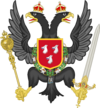Atmoran Armed Forces
This article is incomplete because it is pending further input from participants, or it is a work-in-progress by one author. Please comment on this article's talk page to share your input, comments and questions. Note: To contribute to this article, you may need to seek help from the author(s) of this page. |
The Atmoran Armed Forces (AF) (Iravian: Atmoraanse Krijgsmacht, AKM), also known as Her Majesty's Armed Forces (Dutch: Harer Majesteits Strijdkrachten, HMSK), are military services tasked with the defence of the Atmoran Confederation. They also promote Atmora's wider interests and provide humanitarian aid.
The Commander-in-Chief of the Atmoran Armed Forces is High Queen Katherine II, to whom members of the forces swear allegiance. The Atmoran Armed Forces is led by the Chief of the Defence Staff; Field Marshal Francis van Greyffenswerth, who is advised and assisted by the Defence Council and leads the Armed Forces Command. Overseas garrisons and facilities are maintained across the Atmoran Confederation.
History
Origins and formation
Prior to Atmoran unification in 1812, the Atmoran states each maintained their own military and paramilitary forces till the Atmoran Unification War and the conventions and final signing of the Constitution of the Atmoran Confederation with the Federal Parliament passing the Federal Military Authorisation Act of 1815 (Federale militaire machtigingswet) unifying the various independent armies and navies into a single unified command under the Ministry of War and the Ministry of the Navy.
Modelled on the Royal Lieseltanian Army were to be unified into the Royal Army (Rijksleger) during times of war and undergo standardisation and training during times of peace. The Monarch of Atmora who held the position as the President of the Confederation (Presidium des Statenbond) would, in times of war, be Commander-in-Chief of the Royal Army. During times of peace, the states of Brunswijk, Asvarre, Gallia, Huldenberg, Larsenburg and Lieseltania would all maintain respective command over their armies, but would standardise in the Lieseltanian army model.
For the formation of the Royal Atmoran Navy, all navies of the respective states would be merged into the unified national navy following Royal Lieseltanian Navy, Royal Gallian Navy, and Royal Asvarrese Navy naval traditions. The Ministry of the Navy and the Admiralty Board would assume full control over the Navy acting in place of the Atmoran crown as Commander-in-Chief of the Navy.
Atmoranisation of the states armies was under full swing during the Alexandrine Wars in which the Atmoran Army and the Royal Atmoran Navy were used extensively in the Atmoran-Mizuhese War, Voshan Interior Wars, Atmoran-Fusang War, Aravean Civil War, and the First Ghelen War in the early and mid 19th century. The Voshan Interior Wars by the 1860s became increasingly unpopular in the Catholic states of the Confederation protesting catholic soldiers being deployed in the colonies, leading to the formation of colonial militias.
Atmora's failures in suppressing the Autumn Revolution in 1904 and the start of the Vozhsk War of Independence in 1911. The Atmoran Army's failures in securing victory in Vozh led to Atmora signing the Treaty of Lechtenstad in 1913. From 1915 to 1920, the Atmoran military underwent the Seilheimer reformations of Field Marshal Constans Seilheimer and Chancellor Reinout E. Bolkesteijn reorganising and strengthening the national army. Chancellor Bolkesteijn and Field Marshal Seilheimer passed the National Defence Act (Wet op de Nationale Defensie) on 20 January 1917, forming the Ministry of National Defence and dissolving the various independent state armies.
Empire and the Third Voshan War
The Cold War
Current structure
Budget
Personnel
Personnel in each service
| Atmoran Armed Forces | ||||
|---|---|---|---|---|
| Active | Reserve | Governing Body | Area | |
| 562,365 | 618,670 | Ministry of National Defence | ||
| 337,325 | 128,851 | Ministry of National Defence | ||
| 106,760 | 19,345 | Ministry of National Defence | ||
| 312,854 | 171,400 | Ministry of National Defence | ||
| 1,319,304 | 938,266 | |||
| National Marechaussee and Others | ||||
| Active | Auxiliary | Governing Body | Area | |
| 268,243 | 87,500 | Ministry of State Security | ||
| 189,561 | 31,671 | Ministry of Finance | ||
| 37,100 | 9,460 | Ministry of State Security | ||
| 494,904 | 128,631 | |||

